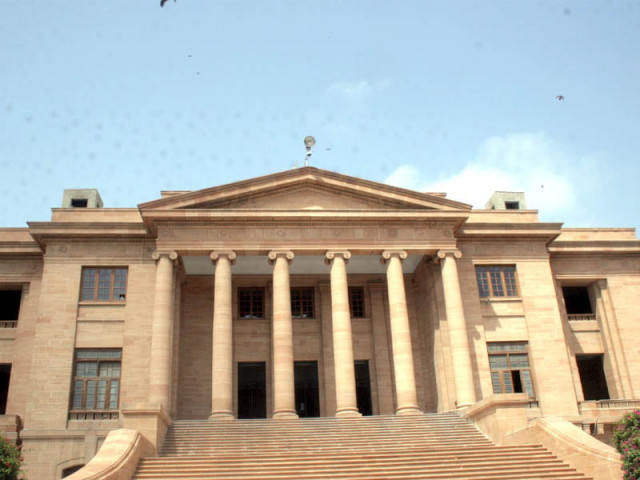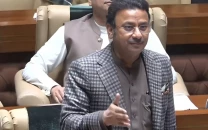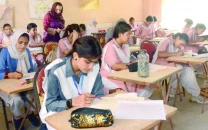Monetary solace: Courts to go fast track on compensation cases
Decision taken after SHC finished hearing 12-year-old case of man crushed to death by an NLC vehicle.

Sindh High Court building. PHOTO: EXPRESS
Dozens of the families who have lost loved ones to 'unnatural' causes, such as negligence either on part of public servants or private persons, can now expect early decisions in compensation cases.
The Sindh High Court (SHC) has decided to conduct fast-track hearings on cases filed by the legal heirs of the victims seeking compensation from the accused, an official privy to the developments told The Express Tribune.
A judicial officer said that SHC chief justice Sajjad Ali Shah had recently passed directives to the officials concerned to include lawsuits claiming damages in the category of 'fast track' and be assigned 'priority'.

The 'fast-track' category was introduced at the SHC back in 2012 under the directives of then chief justice, Mushir Alam, to give priority to cases filed by widows, orphans and senior citizens. "In the continuation of the earlier circular … dated October 16, 2012, the Chief Justice has been pleased to direct that henceforth all the pending and fresh cases filed by widow/orphan(s) or parents of the deceased under the Fatal Accidents Act, 1885 be treated as fast track cases," stated an official notification issued by the SHC registrar's office on March 26.
The Fatal Accidents Act, 1885, provides for claiming damages over the loss of lives of citizens who have died an unnatural death because of negligence of others.
"It has further been directed that while fixing the cases, the fast track cases be assigned priority and exempted from operation of approved policy notified … [on] January 18, 2016," the notification added. The judicial officer said that the directives have been communicated to all the judges hearing such cases at the high court's principal seat in Karachi and the three circuit benches in Hyderabad, Sukkur and Larkana.
These directives came on the recommendation of a single judge, who was hearing a widow's 12-year-old case against the National Logistics Cell (NLC). The plaintiff, Hina Ghouri, had instituted a lawsuit claiming damages from NLC, whose trailer-truck had crushed her husband, Abdul Haq Ghouri, to death in 2004. After 12 years, the judge ordered NLC to pay Rs21.6 million as compensation to the legal heirs.
"Normally, the suits claiming damages take ages to decide because of inordinate delays caused by the defendants that include the federal and provincial authorities and private persons," said Advocate Nasir Maqsood, who won Rs21.6 million damages for Hina.
Currently, Maqsood is pleading around 160 lawsuits and appeals on behalf of the legal heirs of the people, who had died in various accidents because of negligence on part of the government authorities as well as private individuals.
He told The Express Tribune that the single court that gave the order in Hina's favour took exception to such delays caused by the defendants and recommended the chief justice pass an administrative order to hear these cases promptly.
Who is sued
There are dozens of such cases filed by the legal heirs of the victims that are pending disposal in SHC's principal seat in Karachi alone, said a judicial officer. Some of these claims have been made against government departments and utilities, such as K-Electric, Water and Power Development Authority, Hyderabad Electric Supply Corporation, Pakistan Railways, the defunct Karachi Transport Company, Pakistan International Airline, Pakistan Steel Mills, Pakistan Air Force, National Logistics Cell, National Highway Authority, Aga Khan Hospital, Liaquat National Hospital, South City Hospital and private transport companies. In many cases, private persons have also been sued.
Advocate Maqsood said many of these cases are pending trial for decades now. He referred to the case of Rahim Ali Palari, who instituted a lawsuit in 1990 claiming damages from the then Karachi Road Transport Corporation (KRTC). A speeding bus belonging to the corporation had crushed Palari's son to death.
Maqsood also cited the case filed by the heirs of Medicare Hospital's female doctor, who was run over by a speeding bus belonging to the KRTC in 1990.
"After nearly 16 years both the cases, like various others, are still at the stage of recording evidence," he said. "The reason for the delays is that the government servants as well as the private witnesses, who had to record their testimonies, have either retired or died in these years."
Once the fast-track hearings begin, the lawyer hoped these lawsuits will provide some relief to the families.
Published in The Express Tribune, April 9th, 2016.



















COMMENTS
Comments are moderated and generally will be posted if they are on-topic and not abusive.
For more information, please see our Comments FAQ